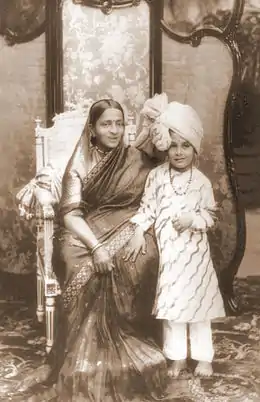Kempa Nanjammani Vani Vilasa Sannidhana
Maharani Kempa Nanjammani Vani Vilasa Sannidhana (1866–1934) was a queen and regent of Mysore; regent between 1895 and 1902 during the minority of Krishnaraja Wadiyar IV. She was the wife of Maharaja Chamarajendra Wadiyar X and the mother of Maharaja Krishnaraja Wodeyar IV. She occupies as significant place as any in the annals of Mysore history. Her contributions to the citizenry, her roles of Maharani as regent and as queen mother of young prince Krishnaraja Wadiyar IV, one of the most illustrious rulers of India, has remained commendable. She is considered as one of the three rare gems in the history of Mysore queens.
| Kempa Nanjammani Devi C.I. | |
|---|---|
| Maharani of Mysore | |
 Maharani Vani Vilasa with grandson Jayachamarajendra Wadiyar | |
| Born | 1866 Kalale, Kingdom of Mysore |
| Died | 7 July 1934 (aged 67–68) Bangalore, Kingdom of Mysore |
| Spouse | Chamarajendra Wadiyar X |
| Issue | Krishnaraja Wadiyar IV Kanteerava Narasimharaja Wadiyar Jayalakshmi Ammani Krishnaraja Ammani Chaluvaja Ammani |
| House | Wadiyar dynasty |
| Father | Narasarajae Urs |
| Mother | Kempananjammanni |
| Religion | Hinduism |
Life
She was married to Maharaja Chamarajendra Wadiyar X on 26 May 1878. In 1881, the famous Rendition of Mysore was carried out and the British handed over the rule back to the natural prince Chamarajendra Wadiyar X, who was now 18, after 50 years. In 1884, Krishnaraja Wodeyar IV was born to the royal couple. In quick succession, they also had another son, Kanteerava Narasimharaja Wadiyar, and three daughters.
Regency
Maharaja Chamarajendra Wadiyar, on a visit to Calcutta in 1894, developed diphtheria and succumbed to sudden death there, thus abruptly cutting short, a promising reign that lasted only 13 years. He was just 32 and had already left his mark as an excellent leader. His death suddenly created a void as prince Krishnarajendra Wadiyar IV was still in minority. The unexpected tragedy was regarded as a great national misfortune throughout India and was deplored by the British Government as an Imperial loss. The royal family plunged into great sorrow and the citizens felt orphaned. Such was his stature. The burden fell on Maharani Kempananjammanni. History posed a new challenge to her: a severe bubonic plague struck Mysore city, reducing the population to half. Under such circumstances, she was nominated as queen-regent, a post she held for about eight tough years, from 1895 to 1902, and served the people with great aplomb, dignity, devotion, discipline and distinction. She earned the respect of one and all for the fabulous way she held fort.
She had the services of Dewan Sir K. Seshadri Iyer at that time and Sir T. R. A. Thumboo Chetty the Former Chief Judge, Senior Member of the Regency Council, who officiated many times as the Dewan, and later her brother Sir M. Kantaraj Urs (later Dewan) as her Private Secretary. She helped Mysore recover from slump. Progress in all fields resulted from their efficient administration and blessed the entire citizenry. Generation of electricity from river Cauvery, promoting Indian Institute of Science, construction of Mari Kanave Valley Anicut (Vani Vilas Sagara), construction of the new palace, extension of new localities in Mysore, water supply through pipes, and laying of foundation stone of Victoria Hospital in Bangalore were enough testimony.
Prof. Rao Bahadur R Narasimhachar
Maharani Kempananjamanni was a great believer in women's education and under her patronage Maharani's College got all due attention. She was a staunch follower of Hinduism, but respected all faiths equally.
Retirement and last days
When Krishnarajendra Wadiyar IV came of age, it was time for her to retire. On 8 August 1902, he ascended the throne that marked the end of memorable regency and the beginning of what was to become Mysore's Golden Era, an era that came to be known by the encomium 'Ramarajya'. The British Government awarded her with a CI.
After a brief illness, she died on the midnight of 7 July 1934, in Bangalore.[1]
Legacy
There are many edifices in old Mysore area with prefix 'Vani Vilasa', Water Works (Vani Vilasa Sagara dam), Maternity Hospital, Girls High School and college, Bridge, Ladies Club, and a Road, which, to this day, commemorate her memory.
References
- "Queen Mother of Mysore Dead". The Indian Express. 9 July 1934. Retrieved 8 May 2017.
External links
- Royaloo Chetty, T. (1909). A Brief Sketch of the Life of T. R. A. Thumboo Chetty, C.I.E, Formerly Chief Judge and Officiating Dewan of Mysore. Hoe & Co.Madras.